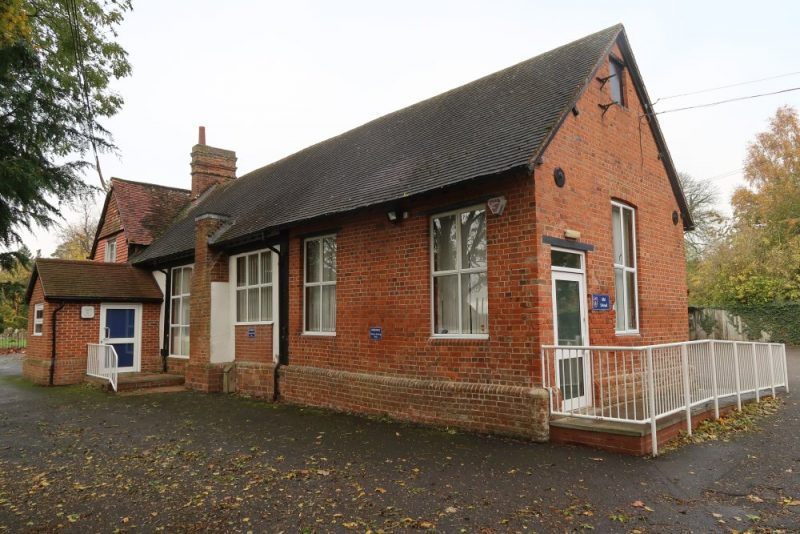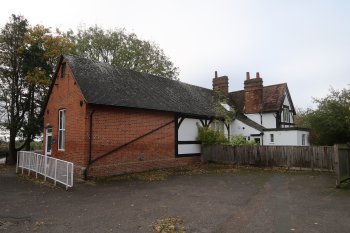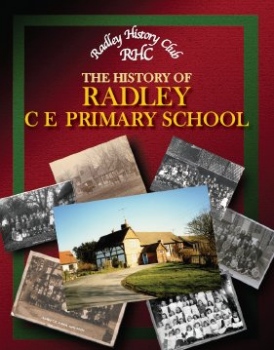On 3 September 1939, Great Britain and France declared war on Germany. Soon afterwards Miss Cross, who had recently been appointed as headteacher of Radley Church of England Primary School, had a gas mask practice with the children. Although some parents had said the children disliked wearing them, they all put them on except for one child who only agreed after some persuasion. The holding of practices seems to have lapsed somewhat during the ‘phoney’ war, but the school children again had to carry gas masks in May 1940 following the invasion by the Germans of Holland and Belgium, and attacks on French territory. The children had to learn how to put on each other’s masks. During the occasional gas mask drills, the children in the infants’ class had to wear their masks for a quarter of an hour then rest for 30 minutes. Miss Cross ordered boxes for the gas masks and made it known to the authorities the mica eyepieces were broken in many of them. She was still waiting for replacements many months later.
At this time the school had two classrooms – one was built in 1872 adjourning the School House (where the headteacher lived) and the other in 1892. A porch was added in 1905. At the beginning of 1940 it was very cold and there were problems with very cold classrooms and frozen pipes as fuel was not easy to come by. For the first time since war was declared a ton of coke was delivered for the stove for which Miss Cross was most grateful. The need to conserve coal, used on the open fires, was highlighted when she had both classes in one room as she was worried that the open fire burned two buckets of coal each day.
The school had wire netting fitted to the inside of the windows and the church became the air raid shelter. Later a first aid box and a stirrup pump were delivered. The children were taught how to use the stirrup pump and approach a fire.
In June 1940 the school held some air raid practices. The staff could take the children in from play to the church with gas masks, books and dinners, etc. in 2½ minutes. Every child had its own place in church and had instructions as to what to do in case of bombs dropping in the neighbourhood. The children practised going under the pews. There were several air raid alerts and the school went into the church each time. However, Miss Cross preferred to send the children home if she could as the church was cold and damp. Some bombs dropped near Abingdon, but none seem to have been dropped on Radley. Miss Cross commented in the school logbook that on 27 June there had been no air raid the night before, which meant the children didn’t feel tired the next day.
The children and staff at the school helped to raise money for the war effort and people disadvantaged as a result of the war. Six shillings were raised in 1940 and, at about the same time, the children brought in pennies and raised the same amount for Finnish children.
In July 1941 the boys, during their spare time, cut thistles in the meadow next to the playground and put them into ricks. Their usual playing field was very dry and the grass was dying, whereas the rest of the field was covered with long grass and thistles. The boys worked for Mr Greening at Church Farm, who was very short of staff, in return for the use of the field during playtime and lessons. In May 1942, during the last quarter of an hour of the school day, the boys raked up straw that had blown all over the place in the high winds. The playground was where the tarmacked area between the old school and the newer building is now. The children also played on the field where the new cemetery is.
An expansion of the school meals service locally meant that, in December 1941, about 72 of the children started to have school dinners. This number included the evacuee children (see Evacuees in Radley in World War Two for more about these children). School dinners, which were provided by the local authority and were not part of the food rationing system), were free for the low-income families; others paid 4–5 old pence per meal to cover the cost of ingredients.
In May 1942 the drill lesson was interrupted by aeroplanes flying overhead. The log books do not say whose they were.
In May 1943 a ‘Wings for Victory’ week was held. A concert and dance took place in the village and nearly every child went to it, which meant the children were quarrelsome and very tired the next day. Consequently half an hour of rest had to be given in the afternoon. Warrant Officer Fairman of the RAF came to the school and spoke to the children on ‘Wings for Victory’. He told the children about bombers and answered their questions. Thirty of the older children went with Miss Cross to an exhibition and films in Abingdon about the subject.
The end of 1943 saw Miss Cross going to a conference on fuel economy and the children giving a concert in aid of the Waifs and Strays Society. ‘Salute the Soldier’ week took place in June 1944.
Mr Buston of the Ministry of Supply came one afternoon in July 1944 to talk to the juniors about the need for a greater drive on the National Book Recovery Campaign. On the morning of 25 July, a van from Abingdon Rural District Council came to collect books for the ‘Books for Forces’ drive. About a thousand books had been collected by the school. George Steptoe’s reward for collecting 250 books was to become a ‘Field Marshal’; Geoffrey Hellman was a ‘General’. The books were needed for prisoners of war, armed forces personnel in camps, and for selling if rare or if not in good enough condition to be recycled to recover the paper.
By September 1944 the boys were collecting wood for the school fires from Mr Shaw’s sawmill in Lower Radley during the dinner hour. But by January 1945 he wasn’t able to let them have any more. Fortunately the bursar at Radley College had two large piles of wood which needed clearing in a hurry. The children managed to do it in two lunch hours and one afternoon!
A further task imposed in 1944 by the authorities on Miss Cross as head teacher was to identify which children were growing at more than the normal rate and thus qualified for extra clothing coupons (practically everything that could be bought was rationed by this time). She did this by measuring the children’s feet to find out if they were long enough to qualify. Seven girls were eligible. This happened again the following year. In the years just after the war, chocolate powder was distributed to the children to take home about twice a year.
January 1945 was cold and snowy. The thaw set in at the end of the month but the dinner vans could not get through, as the roads were impassible. Where possible, children were sent home for lunch. Those whose parents were out at work had hot cocoa, toast, bread and jam in school. One day only 20 out of 84 children were present, so Miss Gower taught them all while Miss Middleton and Miss Cross got on with the stocktaking. The school had to close for one day because the playground was too muddy, stopping the children from crossing it to reach the ‘offices’, or toilets as we now call them.
During the afternoon of 7 May 1945, news came through that the German wireless had announced the complete surrender of all German forces on land, sea and air. Miss Cross told the children to listen to the wireless that night and, if 8 May was declared ‘Victory in Europe’ Day – which it was – then there would be a holiday for two days.
Views of the two sides of the Victorian school building, November 2019
The School House is seen at the far end – Miss Cross was the last headteacher to live there.



For a history of the school from its beginnings in Victorian times to the present day, see The History of Radley C E Primary School, published by Radley History Club.